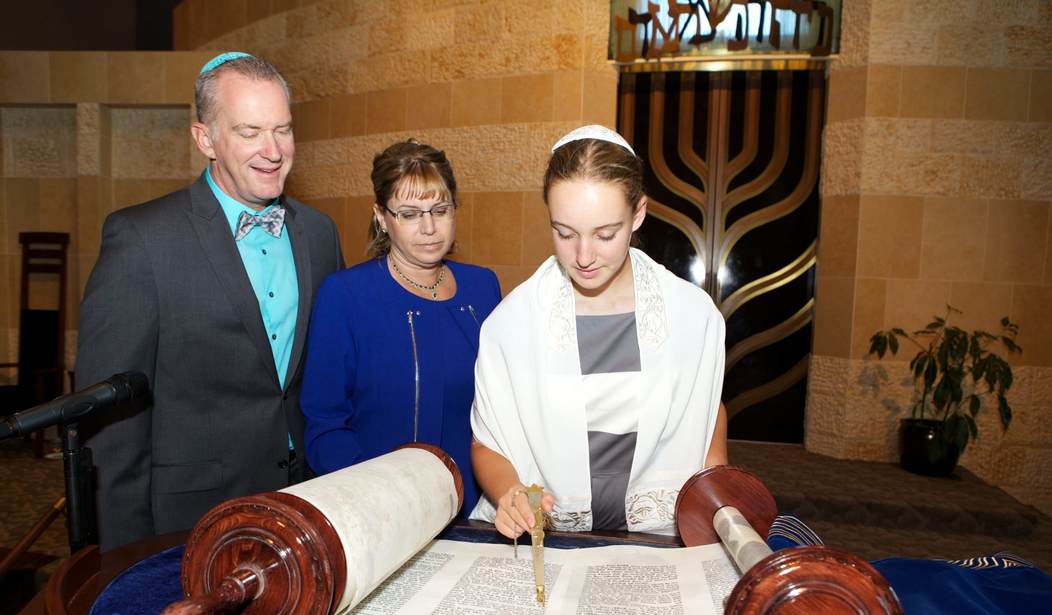The holiday of Sukkoth concludes by gliding into Shëmini ‘Atzereth, the “Eighth [Day] of Assembly,” also called Simchath Torah — the “Joy of Torah.”
Since time immemorial, this holiday marks the end of an annual cycle of reading the five books of the written Torah, and simultaneously the beginning of the next cycle. It is a day of great rejoicing, with dancing and singing in every synagogue and study hall in Israel. Indeed, the day is best observed in the setting of a yëshiva, surrounded by people whose lives are devoted to the study and teaching of Torah.
To understand the source of this rejoicing, it helps to have recourse to the last parasha of the written Torah, in which we read:
Torah tzibba lanu Moshe, morasha qëhillath Ya‘aqov. Vayëhi bIshurun melech bëhith’asséf rashei ‘am, yachad shivtei Yisra’él.
Moshe commanded us Torah, an inheritance of the community of Ya‘aqov, And there was in Yëshurun a king at the gathering of the heads of the nation together, the tribes of Israel (Deuteronomy XXXIII, 5-6).
The word morasha (translated as “inheritance” above) is interesting. It seems to be derived from the same root as yërusha (“inheritance”) which, indeed, is how Onqëlos translates the word. However, the Talmud (Bava Bathra 119b) tells us that Moshe himself struggled with its meaning, concluding that the two words are quite distinct: “The Torah is not an inheritance for you … it is a morasha, not a yërusha.” And yet, elsewhere in the Talmud (Sanhedrin 91b) we find: “Anyone who holds back a halacha from a student is as though he has robbed him of his father’s legacy,” citing our verse in support! Clearly the distinction requires elucidation.
Another problem with the translation offered above lies in the grammatical form of the text. “The inheritance of the community of Ya‘aqov” ought properly to be rendered in Hebrew as moresheth qëhillath Ya‘aqov or morasha liqhillath Ya‘aqov (indeed, such major commentators as Rashi, Even ‘Ezra, and the Ramban all resort to the latter phrase in explaining the verse). Even though, as the Even ‘Ezra points out, the syntax lacking the dative prefix is not unheard of, it is unusual and requires interpretation.
The Talmud Yëeushalmi (Bava Bathra VIII, 2) offers an intriguing insight into the meaning of morasha: “Every occurrence of morqasha is an expression of diha.” Rabbi Moshe Margalith, 18th century rabbi of the city of Brody in Russia (the Pënei Moshe), explains that a diha is a “dark, doubtful expression,” and applies it in our context as meaning that “one bequeaths to one’s children but they do not inherit in their own right.” Thus, morasha signifies a bequest that is not automatically inherited, or perhaps more to the point, a case in which what the heirs inherit is the opportunity to earn their legacy.
With this in mind we confront another Talmudic pronouncement. In Sanhedrin 59a we learn that “an idolator who occupies himself with Torah should be liable for death.” Again, our verse is adduced as the reason: Lanu morasha vëlo’ lahem, “it is a legacy to us and not to them.” This, then, provides the key to understanding the statement from Sanhedrin previously quoted above: A “student,” someone who is investing the necessary effort to learn and thus come into his legacy, who is prevented from learning from a potential teacher, is indeed being robbed of his inheritance. Torah, it seems, is the common legacy or heritage of all Israel who make the effort to acquire it; unlike a familial heirloom, the prospective heir must earn it.
Now we turn our attention to the grammatical point. The phrase morasha qëhillath Ya‘aqov, just as it is, can be read: “The community of Ya‘aqov is an inheritance.” Read in this way, it confers a special poignancy on the next verse. Whether we understand the “king” of the verse to be G-d (as Rashi and Sforno do) or to be Moshe (as the Even ‘Ezra and Ramban do) is immaterial: the point is that the vital condition enabling Israel to accept the Torah commanded by Moshe was yachad shivtei Yisra’él, the unification of all factions and camps in Israel, acknowledging as king only G-d (or His lawgiver). Israel from the beginning has been a nation of factions, of “tribes.” When we work to achieve the common legacy of a qëhillath Ya‘aqov, we are enabled to accept the Torah.
The great Rabbi Yisha‘aya haLévi Horowitz, revered as the Shëlah, tells us that there is an intimate connection between the parashoth and the season. Perhaps the connection between this joyous holiday and the last parasha in the Torah lies in this: “Vayëhi bIshurun melech. We have just come through the High Holy Days, in which all Israel have re-affirmed G-d’s Kingship. Ainu Malkénu, we have cried; our Father, our King,” Melech hamishpat, “King of judgment.”
Now, we have all (may it please G-d) been acquitted on the awesome Day of Atonement, and entered immediately on the holiday of Sukkoth, rejoicing (among other reasons) in our acquittal. The holiday season ends with Simchath Torah. In this celebration, the whole of the qëhillath Ya‘aqov are united in the Torah tzivva lanu Moshe, without regard for any of the differences which separate our modern “tribes”: all are submerged and subsumed in the unity of our unique Torah.
May it be G-d’s will that Moshe’s exhortation of the qëhillath Ya‘aqov be a morasha which we work to acquire, so that the spirit and wisdom of the holy Torah will inform and enlighten all of us throughout this new year.









Join the conversation as a VIP Member